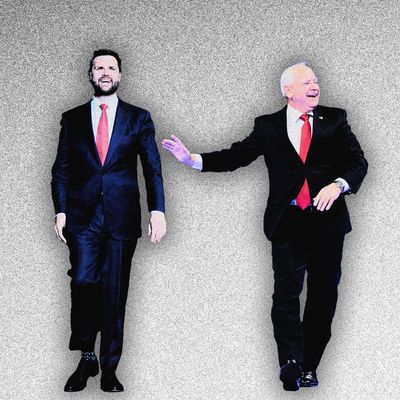

Photo-Illustration: Intelligencer; Photos: Getty Images
Senator J.D. Vance of Ohio has been the Republican nominee for vice-president for nearly a month now. Governor Tim Walz of Minnesota was named Kamala Harris’s running mate just last week. But already these two men have gotten more attention than is typical for veep aspirants. And in the early running, Walz is by most accounts getting significantly better reviews.
To be clear, vice-presidential nominees don’t usually have much of an impact on the outcome of presidential elections. Even in circumstances where one running mate is clearly doing better than another, you have to go all the way back to 1960 and Lyndon Johnson to find a vice-presidential nominee thought to have made a crucial difference (and even that example is disputed).
But at least intermittently, running mates can influence perceptions of the entire ticket and its message. That could be the case this year as Donald Trump struggles to shake perceptions that he’s as old as, and a lot more unstable than, Joe Biden, while Kamala Harris tries to define herself as a solid presidential pick.
In choosing their running mates, both presidential nominees turned down the options of pursuing a battleground-state advantage or sending reassuring ideological signals to swing voters. Vance was the cookie on the plate most pleasing to hard-core MAGA ideologues like Steve Bannon, Tucker Carlson, and Donald Trump Jr. But as a freshman senator who did not exactly wow voters in his home state of Ohio in 2022, Vance was an uncertain asset in the general election itself, and careful observers in both parties knew he had a knack for the kind of provocative remarks that are an opposition researcher’s dream. While Walz is not anyone’s idea of a rigorous lefty, by the time Harris chose him, he had become the veep prospect least offensive to progressive Democrats. Perhaps more importantly, he was already showing some serious political chops via his shrewd use of social media and his presentation of precisely the kind of sharp-yet-friendly personality Democrats seemed to want.
Both presidential campaigns and their media allies have devoted some resources to bashing the VP nominees, with Team Trump and conservatives labeling Walz a “radical leftist” who has lied about his military record, while Democrats have feasted on a rich menu of Vance’s edgier ideological utterances and “weird’ vibes. At this point, Walz is coming across much more effectively than his Republican rival. Indeed, while there isn’t a lot of national polling on him just yet, and a lot of Americans don’t know enough about him to hold an opinion, it appears he’s the only presidential-ticket member in either major party who isn’t underwater in terms of personal favorability. An August 8 YouGov survey placed his favorable-unfavorable ratio at 41 to 30 percent, which these days is rather impressive. Vance’s popularity, by contrast, is underwater and still sinking. As the Washington Post’s Aaron Blake noted, initial exposure to Vance did not improve his image:
His net favorable ratings have dropped:
Three points in Reuters-Ipsos polls between July 16 and July 28 (the end dates for the polls).
Five points in Economist-YouGov polls between July 23 and July 30.Eight points in AP-NORC polls between July 15 and July 29.
Nine points in other YouGov polls (that weren’t sponsored by a media outlet) between July 15 and July 25.
Nine points in ABC News-Ipsos polls between July 20 and July 27.
And six points in a new NPR/PBS/Marist College poll, versus its July 22 poll.
As of August 12, Vance’s favorability ratio is the inverse of Walz’s: In the FiveThirtyEight averages, he’s at 31 percent favorable to 41 percent unfavorable.
So if Vance’s selection was in part designed to offset Trump’s now-more-exposed age and incoherence with an image of youth, vigor, and verbal dexterity (he is, after all, the author of a best-selling book), it’s a problem that his utterances have reinforced the impression that he’s a gaffe-prone extremist. This doesn’t disqualify Vance from the time-honored role of campaign attack dog, but if his popularity continues to lag, the Trump campaign may more or less mothball him for the duration or consign him to fundraising among his wealthy friends.
Walz’s rollout has been so very good that it may be difficult for him to maintain his own positive vibe. But he will have an opportunity for a set-piece acceptance speech at the Democratic National Convention in Chicago next week and won’t have a particularly high bar to overcome in comparison to Vance’s underwhelming convention speech in Milwaukee.
Vance will have his own opportunity to contrast himself favorably with his Democratic counterpart if the two candidates debate. Arrangements for a veep debate have been delayed until a schedule of encounters between Harris and Trump has been finalized; at this point there’s agreement on just one debate between the principals, on September 10 with ABC News as the sponsor. There has been a debate between major-party running mates in 11 of the last 12 presidential elections dating all the way back to 1976 (when the late Bob Dole and the late Walter Mondale tilted in Houston), so the odds are high that Walz and Vance will eventually get a chance to exchange witticisms and insults on the same stage.
Source link




